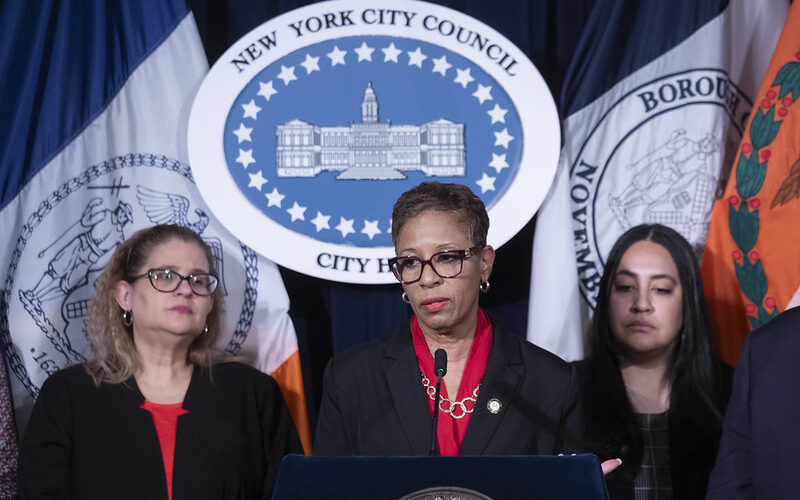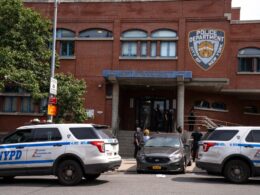The city Charter Revision Commission has proposed a thoughtful series of changes to New York City’s Charter, the city’s local version of a constitution, that would unlock more new housing — especially affordable housing. New Yorkers will get to vote each of the proposals up or down in the November election.
But not if the City Council has its way. First, a majority of council members signed on to an over-the-top mischaracterization of the proposals in late July. Now, Council Speaker Adrienne Adams, joined by other members of the Council’s leadership, is trying to get the Board of Elections to knock the proposals off the ballot.
The Council’s procedural argument is so dishonest, its descriptions of the proposals so misleading, and its omission of the history that brought us to this juncture so egregious, one would be forgiven for imagining that one was watching a typical Trump administration assault on truth and justice, not a challenge led by a Council that holds itself out to be progressive to a degree that is unprecedented.
The Council claims the commission has not fairly described the proposals. Even if that were true (it’s not, as I’ll explain shortly), that’s not up to the Board of Elections to decide. All the legal authority the Council could come up with was one case out of Erie County that: (a) is more than 30 years old; and (b) only held that the Board of Elections could step in where a ballot proposal had not complied with formal certification requirements.
And that case isn’t on point: here, by contrast, the proposals have been properly filed and certified to the NYC Board of Elections. As such, the Board of Elections must put them on the ballot unless and until a successful court challenge (the proper way to object) determined otherwise.
Were the Board of Elections to go along with the Council’s unlawful proposal, it would shamelessly be waving the banner of “informed choice” precisely to cover up a decision to deny New Yorkers the chance to make any choice at all. It would also be cementing its reputation for being an entity stocked with patronage appointees more concerned with the health of the political machines that selected them than with the health of the city.
The main objection of the Council is that the proposals don’t explain that final authority on a variety of land-use matters is being taken away from the Council. Not true.
Even each summary ballot question (limited to 60 words by state law) makes clear that a “no” vote means retaining “final decision by City Council.” And the longer explanations of the proposals that voters will have available (the “abstracts”) go into more detail. Thus, for example, the abstract of the proposal for a new Affordable Housing Appeals Board explains that the appeals board “would replace the existing mayoral veto, and the Council override of that veto, for these types of land-use applications.”
It is also important to note here that council members will be loudly making the public aware of its perspective through direct constituent contact, social and other media, and through a guide available to all voters, a guide which will include “pro” and “con” views as to each measure.
It is not by accident that we live in one of the most racially segregated big cities in the United States and that we suffer with an intense affordable housing crisis. Segregated housing patterns were set out by design long ago, but they have been maintained by policies that targeted subsidized housing only to some neighborhoods and by resistance to the construction of new affordable housing elsewhere.
And at the heart of that has been the practice of the City Council to defer to the wishes of the member in whose district the proposed housing would be located. That “member deference” created an environment where affordable housing development could not rely on clear rules of the road, and where the desperate needs of New Yorkers throughout the city for affordable housing could be subordinated to the parochial, meritless, and sometimes discriminatory concerns of just one of 51 council members.
Sometimes member deference was exercised in service of traditional segregationists (keep our neighborhoods white; sometimes it has been in service of neo-segregationists of other races (easily recognizable for the use of barely coded language such as the importance of maintaining the “cultural history” of racial or ethnic “enclaves). The principle that was consistently opposed or ignored was that all our neighborhoods are supposed to belong to all of us.
Ironically, Speaker Adams considers one of her greatest achievements the creation of a “Fair Housing Framework” law, a law that recognizes that all neighborhoods have an obligation to pitch in to allow the creation of affordable housing. But the framework has no teeth, nothing that requires enforceable change. That was the landscape into which the commission entered.
The Council’s the-sky-is-falling view belies the fact that the measures are modest ones designed to reduce the dysfunction that has plagued housing development (I wish the commission had gone further!) One element of “fast tracking” is limited to 12 Community Board districts (only about 20% of the total) that have had the lowest rate of affordable housing production. Most of the lowest producing districts are, not surprisingly, highly segregated. The other part of fast-tracking deals with publicly financed affordable housing. Both changes are no-brainers.
Another proposal creates a new Affordable Housing Appeals Board. When the Council rejects or modifies a land-use application that would facilitate affordable housing, the appeals board could override that action, thus (appropriately) making the stymieing of affordable housing more difficult.
The Council protests that this is “undemocratic.” But the City Planning Commission part of the process (which comes before Council action) involves a body whose members (other than the chair) are approved by the Council. And the appeals board that takes up its role after the Council acts is made up of democratically elected officials: the mayor, the relevant borough president, and the speaker of the City Council (selected by a majority of council members). An override is effective only if two of the three officials concur. The Council just doesn’t like any flavor of democracy that doesn’t favor hyperlocal control.
The Council’s letter to the Board of Elections is explicit in its desire to maintain council member “leverage” in negotiating individual deals, a process that offers no reliable path for affordable housing development but instead holds development hostage to an individual member’s arbitrary view of what affordability levels should be and what local investment should be made — often leaving aside the reality of what is financially feasible.
Why can’t the Council imagine a world in which it exercises its power openly and directly: insisting in the budgetary process on needed local investment and writing into law across-the-board its preferred affordability requirements? (The dirty secret as to the latter is that too many council members still indulge the view that some communities should remain communities of poverty and others remain communities of wealth, with affordability requirements varying by location).
Assemblyman Zohran Mamdani — the almost-certain winner of the upcoming mayoral election — has housing development plans that are highly ambitious (in the view of supporters) or highly unrealistic or damaging (in the view of detractors). In either case, the defeat of the proposals would impede his plans substantially and lay down a marker that the Council is committed to the old way of doing things. Will he speak either on the Council’s gambit or on the substance of the proposals? One hopes keeping silent is not part of his campaign’s reported stance of having “no interest in getting bogged down on hot-button issues that have little to do with its core policy slate…”
The reality is that the Council is not concerned that the public will be misled by the proposals, but is concerned that the public, fed up with the decades-long failure of the current status quo, will knowledgeably and eagerly approve them. The stunt of trying to get the Board of Elections to do the Council’s dirty work should be rejected by the board and rejected by New Yorkers.
Gurian is editor of remappingdebate.org and has been a civil rights advocate for more than 35 years.








